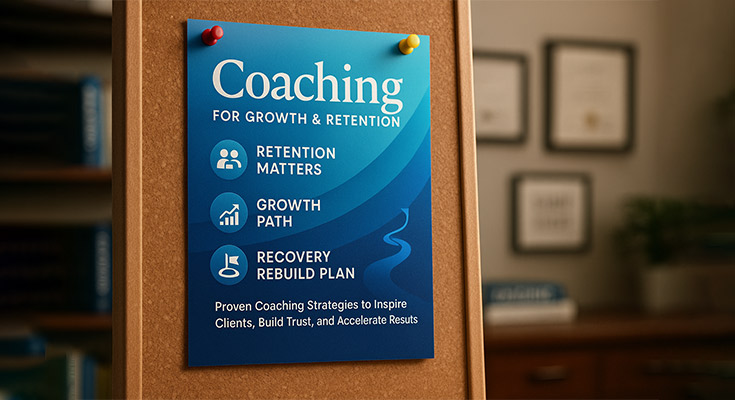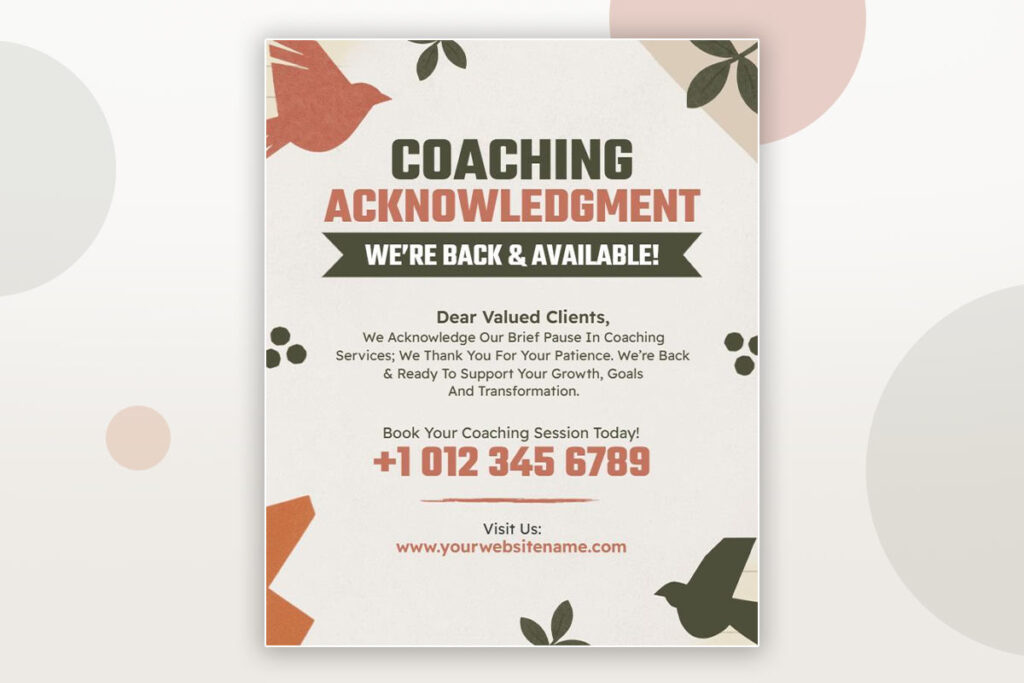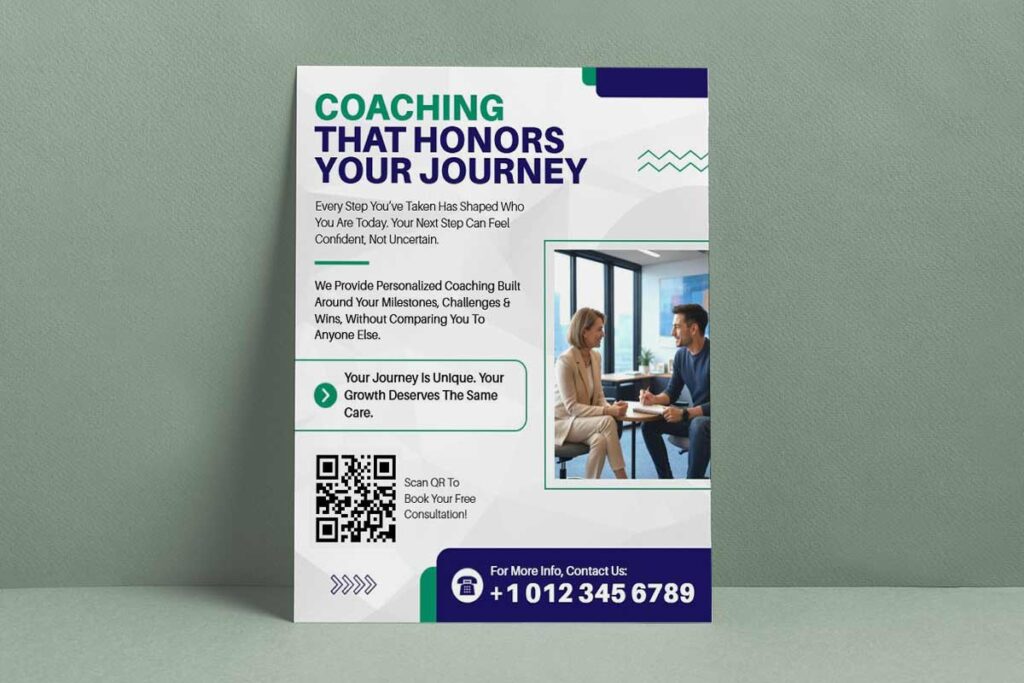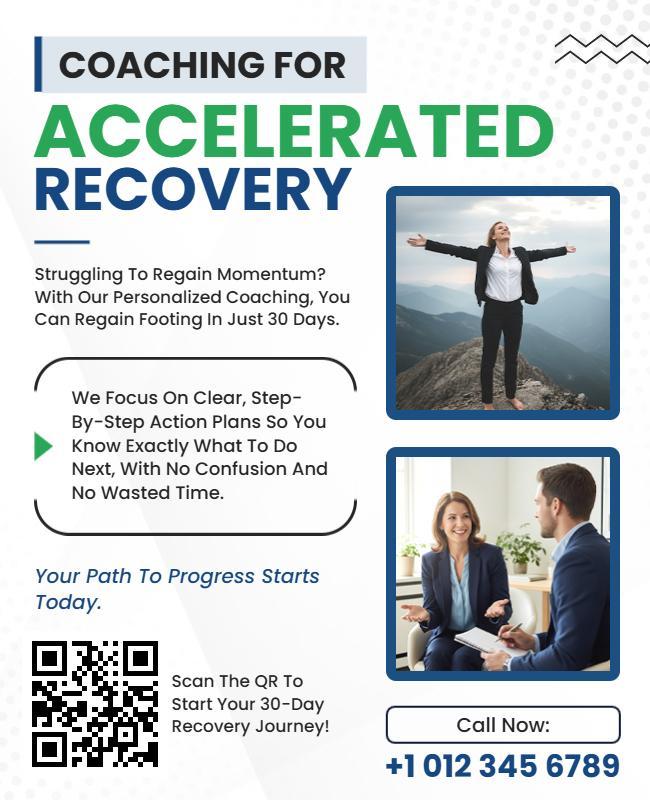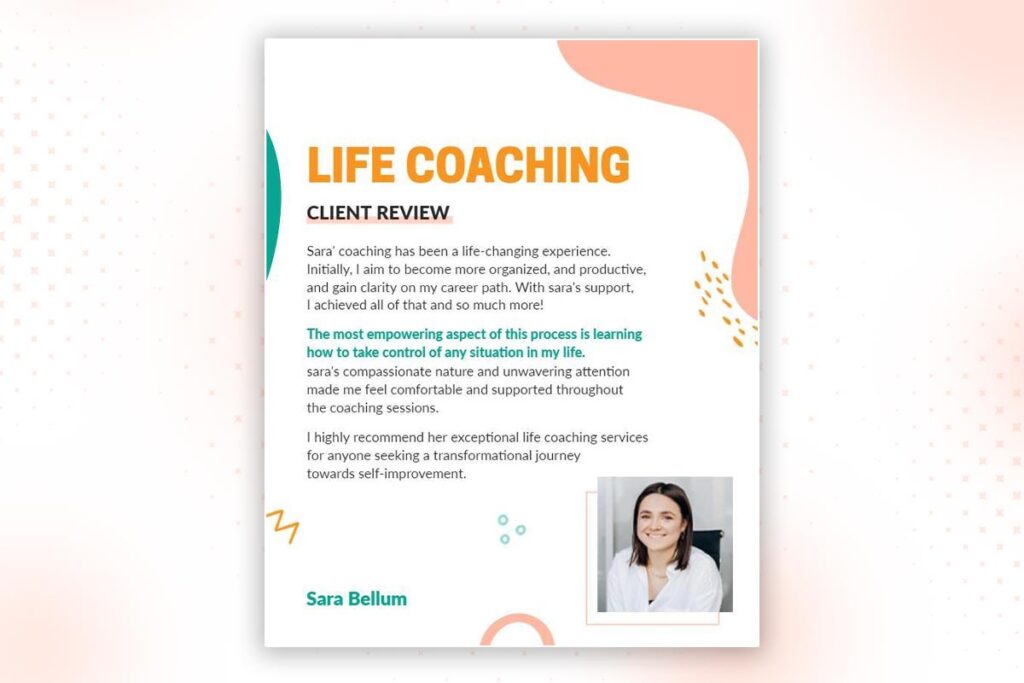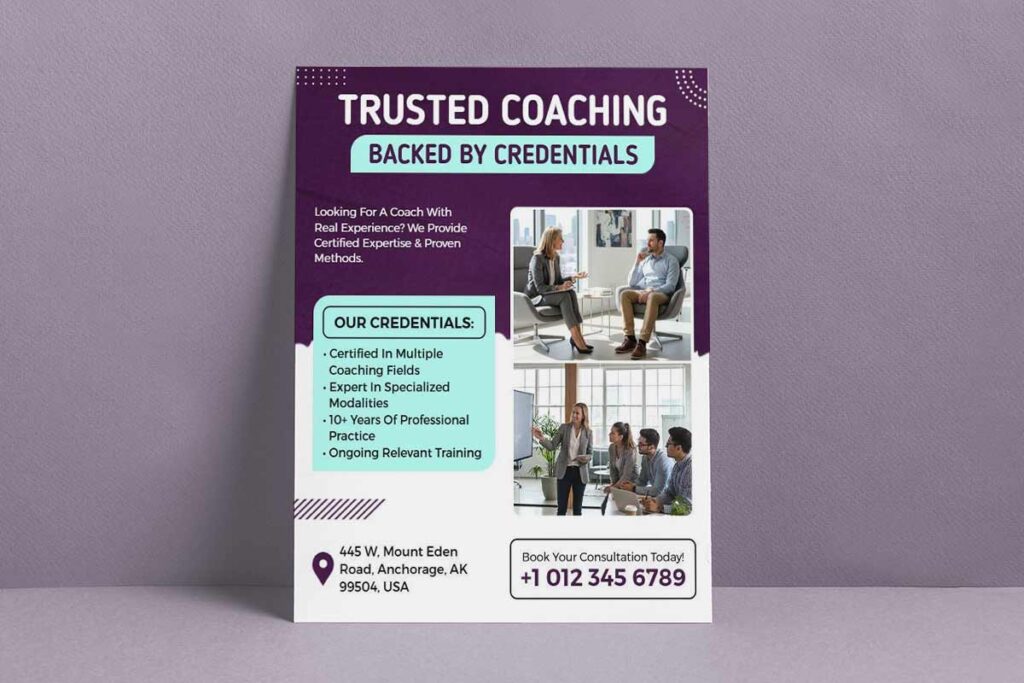Coaches waste countless hours on flyer-based customer relationship recovery that misses the mark, while effective approaches solve business interruptions within minutes. Successful coaching retention flyers combine strategic messaging with Recovery Coaching Specialists targeting to create immediate client re-engagement resolution. Quality implementation requires coaching client retention flyers methodology, life coaching flyers for marketing excellence, and business coaching promotional flyers that drive action while maintaining professional credibility.
Effective recovery specialists use coaching service retention materials to systematically reconnect with clients after disruptions. These marketing materials demonstrate continuity and renewed commitment while addressing client concerns about service stability. Well-designed promotional flyers acknowledge interruptions transparently, reinforce expertise, and present clear pathways for resuming coaching relationships.
This comprehensive guide delivers proven strategies for transparent communication approaches, value reinforcement messaging techniques, and relationship recovery frameworks through structured re-engagement that maximize coaching retention flyers impact and competitive positioning.
How can coaching retention flyers help recovery specialists rebuild client relationships after business interruptions?
Coaching retention flyers serve as strategic re-engagement tools that recovery specialists can use to systematically reconnect with clients after disruptions. These coaching service retention materials demonstrate continuity and renewed commitment while addressing client concerns about service stability. Well-designed flyer templates for life coaching marketing can acknowledge the interruption transparently, reinforce the specialist’s expertise, and present clear pathways for resuming the coaching relationship. By combining empathetic messaging with compelling value propositions, these business coaching promotional flyers help recovery specialists rebuild trust and momentum while positioning themselves as resilient partners in their clients’ ongoing recovery journey.
Transparent Communication Strategies That Acknowledge Service Interruptions
Effective coaching retention flyers address service interruptions directly without over-explaining circumstances. Recovery specialists should craft messaging that validates client concerns while focusing on renewed availability rather than disruption details. Simple acknowledgment statements like “After my recent absence, I’m fully committed to supporting your continued progress” build trust through honest communication.
These life coaching marketing flyers should avoid defensive language or lengthy explanations that might raise additional concerns. Instead, focus on present availability and future commitment. Include specific availability details such as “Now accepting appointments” or “Expanded hours available” to demonstrate operational stability. Recovery specialists benefit from positioning interruptions as temporary challenges that strengthened their dedication to client success. The goal is rebuilding confidence through transparent, forward-focused communication that acknowledges the gap without dwelling on it.
Access ready-to-customize transparent communication flyer templates on DesignWiz that help you acknowledge service interruptions while rebuilding client trust through honest, forward-focused messaging.
- Youth Football Coach Flyer Template
- Women-Specific Fitness Coaching Flyer Template
- Baseball Coaches Wanted Flyer Template
Value Reinforcement Messaging for Demonstrating Continued Expertise
Business coaching promotional flyers must reinforce the specialist’s expertise and value proposition after interruptions. Highlight continuing education, new certifications, or enhanced service offerings developed during the absence. This positions the interruption as professional growth rather than service degradation.
Include client success stories and testimonials that demonstrate ongoing effectiveness and specialized recovery expertise. Feature specific outcomes like “95% of returning clients report accelerated progress” or showcase new methodologies and tools available to clients. Recovery specialists should emphasize their unique understanding of each client’s history and progress, differentiating from crisis management coaches who lack established relationships.
Present enhanced service features such as additional check-in protocols, extended session options, or new group programs. These additions demonstrate growth and commitment to improved client outcomes. The messaging should convey that the specialist has used the time to become even more effective at supporting recovery journeys.
Explore expertise-focused coaching flyer designs on DesignWiz that showcase your continuing education, certifications, and enhanced service offerings to reinforce your professional value after interruptions.
- Head Coach Appointment Announcement Flyer Template
- Cricket Coaching Training Program Flyer Template
- Meet the Softball Coaching Team Flyer Template
Relationship Recovery Frameworks Through Structured Re-engagement
Successful coaching client retention flyers provide clear, low-pressure pathways for clients to resume their coaching relationship. Structure re-engagement as a gradual process rather than immediate full commitment. Offer initial consultation sessions to discuss current needs and goals, allowing both parties to reconnect naturally.
Create tiered re-engagement options starting with brief check-in calls, progressing to single sessions, and ultimately full program resumption. This approach reduces barriers while demonstrating respect for clients’ autonomy in their recovery process.1 Include multiple contact methods accommodating different comfort levels and communication preferences.
Recovery specialists should acknowledge that clients may have worked with other professionals during the interruption without expressing defensiveness. Position your unique value through established rapport and comprehensive understanding of their journey. Highlight benefits of continuity such as “picking up where we left off” and leveraging previous progress rather than starting over.
Frame the reunion as collaboration in continuing their transformation story rather than addressing a problem. Include incentives like extended initial sessions or complimentary progress assessments that demonstrate investment in their success. The goal is creating comfortable conditions for clients to re-engage at their own pace while maintaining professional boundaries and therapeutic effectiveness.
What makes coaching retention flyers effective for re-engaging dormant recovery coaching clients?
Effective coaching client retention flyers combine psychological principles with strategic messaging to reactivate dormant relationships. These coaching service retention materials leverage personalized touchpoints, showcase tangible progress frameworks, and address common concerns about service consistency. The most successful life coaching marketing flyers incorporate visual elements that reflect resilience and growth while presenting clear benefits for resuming coaching relationships. By balancing professional credibility with approachable messaging, these business coaching promotional flyers create compelling reasons for clients to re-engage while minimizing barriers to reactivation and emphasizing the specialist’s commitment to their long-term recovery success.
Personalization Elements That Reconnect With Individual Client Journeys
Effective coaching retention flyers reference specific client milestones and acknowledge individual progress made during previous sessions. Recovery specialists should include subtle mentions of challenges overcome, goals previously discussed, or strengths identified during their work together. This personalized approach demonstrates genuine care and investment in each client’s unique journey.
The most impactful flyers incorporate the client’s preferred communication style and reference shared experiences without compromising confidentiality. Successful marketing materials mention general recovery stages or wellness concepts that resonate with the individual’s journey. These coaching client retention flyers avoid generic messaging by tailoring tone, imagery, and language to reflect the client’s personal recovery approach, whether they responded better to gentle encouragement or direct motivation during previous sessions.
Browse personalized coaching flyer templates on DesignWiz that can be tailored with individual client milestones and journey-specific messaging to create meaningful reconnection touchpoints.
- Life Coach Certification Program Promotional Flyer Template
- Executive Coach Certification Program Flyer Template
- Coaching Certification Program Announcement Flyer Template
- Business Executive Coaching Certification Course Flyer Template
Progress Visualization Techniques for Showcasing Potential Outcomes
Powerful life coaching marketing flyers include visual progress indicators that help dormant clients envision their path forward. Effective designs feature growth-oriented graphics like ascending pathways, milestone markers, or transformation imagery that reinforces the continuous nature of recovery work. These visual elements should emphasize building upon existing foundations rather than starting over.
Recovery specialists can showcase potential outcomes through testimonial snippets, success metrics, or growth timelines that demonstrate realistic expectations. The key lies in presenting progress as an ongoing journey where previous work remains valuable. These coaching service retention materials should include specific examples of how resumed coaching accelerates progress, highlighting the advantage of continuity over switching providers.
Barrier Reduction Methods That Simplify the Re-engagement Process
Successful retention flyers eliminate friction by offering multiple low-commitment reentry options. Instead of requesting immediate full program enrollment, effective materials suggest brief check-in calls, single session reunions, or flexible scheduling arrangements. This approach reduces anxiety around making large commitments after periods of disengagement.
The most effective business coaching promotional flyers provide clear next steps with multiple contact methods accommodating different comfort levels. Include options for text, email, phone, or in-person meetings to match client preferences. Address common concerns directly by acknowledging that breaks in coaching are normal and don’t represent failure. Emphasize that resuming services requires no explanation or justification.
Consider offering incentives like extended initial sessions, discounted rates for returning clients, or flexible payment arrangements that demonstrate investment in rebuilding the relationship. Budget-conscious practitioners can explore coaching budget flyers for affordable marketing approaches that maintain professional quality while managing costs effectively. These coaching retention flyers should position the coach as a consistent support system ready to meet clients where they are, regardless of time elapsed since last contact.
How do recovery coaching specialists design flyers that restore lost client momentum?
Recovery coaching specialists design momentum-restoring coaching retention flyers by focusing on renewal messaging, progress visualization, and action-oriented calls to action. Effective flyers emphasize the client’s journey continuation rather than starting over, using empowering language that acknowledges setbacks as part of growth. Visual elements should include upward trajectory graphics, testimonials from clients who overcame similar challenges, and clear pathways back to coaching engagement. These life coaching marketing flyers succeed when they position the specialist as a consistent support system, offering specific re-engagement incentives while maintaining professional credibility and trust.
Strategic Messaging Frameworks That Reconnect Disengaged Coaching Clients
Successful coaching client retention flyers employ “progress preservation” messaging that validates existing achievements while introducing accelerated pathways forward. Rather than suggesting clients start over, effective frameworks highlight how previous work remains valuable foundation material. Use language like “building on your progress” or “continuing your transformation journey” to maintain motivation while acknowledging interruptions transparently.
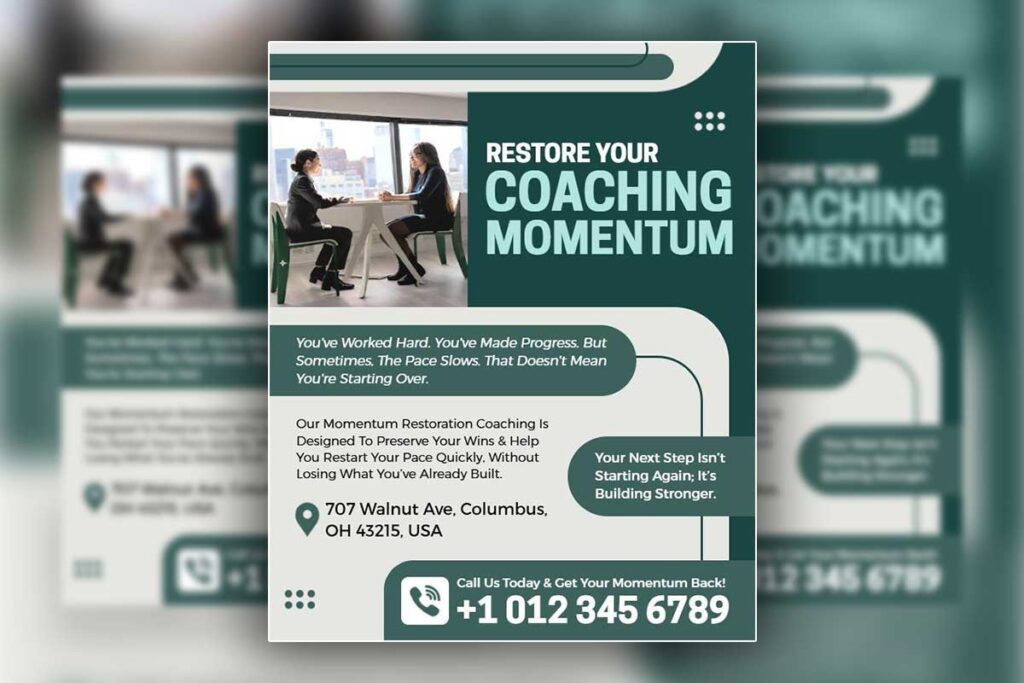
Recovery specialists should incorporate strength-based terminology that reinforces client capability rather than focusing on setbacks. Messages such as “ready to accelerate your growth” or “prepared to reach the next breakthrough” create forward momentum without diminishing past efforts. The most effective business coaching promotional flyers position temporary pauses as natural parts of long-term transformation, using phrases like “every journey includes rest periods” to normalize interruptions while emphasizing renewed commitment to client success. Implementing these frameworks becomes more manageable when coaches utilize coaching acquisition flyers for client growth strategies that have proven effective across different recovery contexts.
Visual Design Elements That Communicate Forward Movement and Hope
Visual psychology plays a crucial role in momentum-restoration through upward-trending graphics, pathway imagery, and progress indicators. Use ascending arrows, mountain peaks, or staircase visuals to subconsciously suggest forward movement. Color schemes should emphasize growth through greens and blues while avoiding stagnant grays or reds that might trigger negative associations.
Typography choices matter significantly for coaching service retention materials targeting momentum restoration. Bold, confident fonts convey stability while script elements add personal warmth. Include authentic photographs showing positive transformation rather than generic stock images. Progress bars or milestone markers help clients visualize their journey continuation. White space prevents overwhelming vulnerable clients while strategic highlighting draws attention to key renewal messages.
Professional headshots of the recovery specialist rebuild personal connection while testimonial quotes from clients who overcame similar challenges provide social proof that momentum restoration is achievable.
Create visually compelling retention flyers using DesignWiz’s collection of upward-trending graphics, pathway imagery, and progress visualization templates designed specifically for coaching professionals.
- Promotional Career Coaching Library Flyer Template
- Online Coding Bootcamp Coaching Class Flyer Template
- Youth Football Coach Flyer Template
- Financial Coaching Consultation Flyer Template
Timing and Distribution Methods for Maximum Client Re-engagement Impact
Strategic timing maximizes coaching retention flyer effectiveness through milestone-based outreach aligned with client recovery cycles. Send initial flyers 2-3 weeks after service resumption when operational stability exists but before complete client disengagement occurs. This window demonstrates renewed commitment while intercepting potential relationship deterioration.2
Anniversary dates of significant client breakthroughs create emotional connection opportunities for targeted distribution. Recovery milestones, completion dates of major coaching phases, or personal achievement anniversaries trigger receptiveness to re-engagement messaging.3 Seasonal transitions like New Year, spring renewal periods, or back-to-school seasons align with natural motivation cycles when clients consider personal development investments.
Multi-channel distribution increases visibility through coordinated mail, email, and text message campaigns. Physical flyers carry weight and permanence while digital versions enable immediate response mechanisms. Professional delivery timing avoids crisis periods or known stress windows, instead targeting stability moments when clients can thoughtfully evaluate re-engagement opportunities.4
Personalized distribution through former client networks, referral partners, and community wellness centers rebuilds practice visibility while demonstrating continued availability. Sequential campaigns at 30, 60, and 90-day intervals maintain consistent presence without overwhelming recipients, allowing natural consideration periods while reinforcing specialist commitment to long-term client relationships.
What psychological elements in coaching retention flyers work best for addiction recovery clients?
Psychological elements that resonate most with addiction recovery clients include non-judgmental language, strength-based messaging, and crisis-resilient positioning. Effective coaching service retention materials avoid shame-inducing terminology while emphasizing personal agency and recovery as an ongoing process. Visual psychology plays a crucial role through calming color schemes, authentic imagery showing diverse recovery journeys, and layout designs that feel supportive rather than overwhelming. Business coaching promotional flyers for this demographic succeed by incorporating social proof from similar clients, addressing common relapse concerns directly, and presenting the coach as an experienced ally rather than an authority figure.
Language Psychology and Messaging Tone for Addiction Recovery Audiences
Recovery-focused coaching retention flyers must employ empowering language that acknowledges setbacks without judgment. Effective messaging replaces shame-based terminology with strength-affirming alternatives: “continuing your journey” instead of “starting over,” “building on your progress” rather than “fixing problems.” The tone should be collaborative, positioning the coach as a supportive partner rather than an expert authority.
Coaching client retention flyers work best when they validate the client’s autonomy and decision-making capacity. Use present-tense, action-oriented language that emphasizes forward movement: “You’re choosing growth” and “Your recovery continues.” Avoid clinical terminology or diagnostic language that might trigger defensive responses. Instead, focus on personal development themes that normalize the coaching relationship as part of ongoing wellness rather than crisis intervention.
Design empowering addiction recovery coaching flyers with DesignWiz templates featuring non-judgmental language frameworks and strength-based messaging that resonates with recovery audiences.
- Retro Bold Life Coaching Services Flyer Template
- Professional Life Coaching Consultation Flyer Template
- Health Coaching Career Launch Steps Flyer Template
Trust-Building Visual Cues and Authentic Representation Strategies
Visual elements must convey safety and understanding without appearing clinical or intimidating. Effective life coaching marketing flyers incorporate diverse, authentic imagery showing people in various stages of recovery and life circumstances. Color psychology matters significantly – soft blues and greens create calming effects, while harsh reds or blacks can trigger anxiety responses.
Typography choices should prioritize readability and comfort over flashy design elements. Clean, simple fonts reduce cognitive load for clients who may be managing stress or anxiety. White space becomes crucial for creating breathing room that doesn’t feel overwhelming. Authentic testimonial photos and genuine success stories build trust more effectively than stock imagery, showing real people with whom clients can identify and relate.
Select from calming, authentic coaching flyer designs on DesignWiz that incorporate trust-building visual elements and diverse representation to create psychological safety for recovery clients.
- Educational Coaching Center Admission Open Flyer Template
- India Sports Coaching Training Flyer Template
- Academic Courses Coaching Classes Flyer Template
- Computer Coaching Institute Courses Flyer Template
Addressing Relapse Anxiety Through Supportive Flyer Communication
Relapse anxiety represents one of the most significant psychological barriers for recovery clients considering re-engagement with coaching services. Coaching retention flyers must directly acknowledge this concern while providing reassurance about the coach’s understanding and non-judgmental approach. Effective messaging includes statements like “wherever you are right now is exactly where we start” and “setbacks are part of the journey, not the end of it.”
Business coaching promotional flyers should feature specific language about confidentiality and trust, emphasizing the coach’s experience with various recovery stages. Including brief mentions of evidence-based approaches or specialized training helps build credibility without appearing overly clinical.
Visual design elements that address relapse anxiety include progress continuums rather than binary success/failure imagery, pathway metaphors that show ongoing journeys rather than destinations, and inclusive representations of different recovery experiences. The goal is creating materials that feel like invitations to reconnect rather than reminders of past difficulties.
Coaching service retention materials must balance honesty about challenges with hope about possibilities, creating psychological safety that encourages clients to take the vulnerable step of re-engaging with professional support.
How can coaching retention flyers address client trust issues after practice disruptions?
Coaching retention flyers rebuild trust through transparent acknowledgment of disruptions, clear accountability statements, and concrete recovery plans. Effective life coaching marketing flyers feature authentic messaging that validates client concerns while demonstrating renewed commitment through specific service guarantees, enhanced communication protocols, and value-added offerings. Recovery-focused flyers should include testimonials from retained clients, detailed explanations of implemented improvements, and personal messages from the coach addressing the disruption directly. The key is balancing honesty about past challenges with confidence in future service delivery, using coaching client retention flyers as trust-rebuilding tools rather than generic promotional materials.
Transparency-Based Trust Rebuilding Through Honest Disruption Communication
Trust rebuilds through direct acknowledgment rather than avoidance. Coaching service retention materials must address disruptions transparently while positioning the coach’s return as strengthened rather than weakened. Effective messaging includes brief explanations without over-sharing personal details, acknowledgment of client impact, and clear statements about operational improvements.
Business coaching promotional flyers succeed when they validate client frustration without dwelling on excuses. Messages like “I understand my absence affected your progress, and I’m committed to helping you regain momentum” demonstrate emotional intelligence while maintaining professional boundaries. Recovery specialists particularly benefit from this approach since their clients understand disruption as part of growth processes. The messaging should emphasize lessons learned and systems implemented to prevent future interruptions, creating confidence in improved stability.
Service Guarantee Messaging That Demonstrates Renewed Coaching Commitment
Service guarantees provide tangible evidence of commitment beyond promises. Coaching retention flyers should feature specific commitments like extended session availability, priority scheduling for returning clients, or additional check-in communications between sessions. These guarantees must be realistic and sustainable to maintain long-term trust.
Effective guarantee messaging focuses on added value rather than discounts. “Returning clients receive priority booking and extended session availability” carries more weight than percentage discounts that can undermine perceived expertise value. Life coaching marketing flyers benefit from guarantees addressing common client concerns: consistent availability, reliable communication, and progress tracking. Recovery coaching specialists can emphasize continuity guarantees like “seamless transition back to your progress timeline” or “customized re-engagement plans based on your current needs.” New practitioners rebuilding their practice can benefit from coaching credibility flyers for new practitioners’ strategies that establish trust even after disruptions.
Personal Accountability Statements That Validate Client Concerns and Experiences
Personal accountability creates emotional reconnection essential for trust restoration. Coaching client retention flyers require genuine statements acknowledging the coach’s responsibility for disruption impact. This involves owning the interruption effects without extensive justification while demonstrating understanding of client perspective.
Accountability statements work best when specific rather than generic. “I take full responsibility for the disruption to your progress during my absence” resonates more than vague apologies. The messaging should validate specific client experiences: missed sessions, interrupted momentum, or confusion about next steps. Recovery-focused accountability particularly emphasizes understanding vulnerability during coach absence.
Effective accountability pairs responsibility acceptance with forward-focused action plans. Statements like “I understand my absence created uncertainty about your support system, and I’ve implemented new communication protocols to ensure consistency” demonstrate both ownership and improvement. Business coaching promotional flyers benefit from accountability that acknowledges professional relationship disruption while emphasizing renewed dedication to client success.
The combination of transparency, guarantees, and accountability creates comprehensive trust rebuilding through coaching retention flyers. This approach addresses client concerns systematically while positioning the coaching relationship for stronger future engagement through demonstrated reliability and enhanced commitment.
What specific messaging in coaching retention flyers resonates with recovery clients who’ve lost progress?
Recovery clients respond to messaging that acknowledges their setbacks without judgment and emphasizes renewed momentum rather than starting over. Business coaching promotional flyers should highlight ‘progress preservation’ concepts, showing how previous gains remain valuable foundations for continued growth. Effective coaching service retention materials feature messaging about ‘building on existing strengths,’ ‘accelerated recovery pathways,’ and ‘customized re-engagement plans.’ The language should be empowering rather than remedial, focusing on resilience themes and forward momentum. Recovery coaching specialists need flyers that position temporary setbacks as natural parts of transformation journeys while offering concrete strategies for regaining lost ground quickly.
Progress Preservation Messaging That Values Previous Client Achievements
Recovery clients need reassurance that their previous work retains value despite current setbacks. Effective coaching retention flyers emphasize phrases like “building on your foundation” and “leveraging what you’ve already learned” rather than “starting fresh.” This messaging validates their investment in the coaching process and reduces the psychological barrier to re-engagement. Life coaching marketing flyers should reference specific achievements when possible, using language like “your breakthrough moments remain powerful tools” or “the skills you developed haven’t disappeared, they need reactivation.”
Visual elements supporting this messaging include progress bars showing partial completion rather than reset buttons, timeline graphics highlighting maintained achievements, and before-and-after imagery that acknowledges the middle ground between success and starting over. The key is positioning setbacks as temporary pauses in an ongoing success story rather than failures requiring complete reconstruction.
Accelerated Recovery Pathway Communication for Momentum Restoration
Coaching client retention flyers must present clear, achievable pathways back to progress momentum. Messages like “rapid re-engagement program” and “fast-track return protocols” appeal to clients who feel they’ve lost time and want to recover quickly. Business coaching promotional flyers should outline specific timelines and milestones, such as “regain your footing in 30 days” or “restore confidence within two weeks.”
The messaging should emphasize that previous coaching experience creates advantages for faster recovery. Phrases like “your coaching history accelerates the process” and “familiar tools, faster results” help clients understand they’re not beginning from zero. Effective coaching service retention materials include testimonials from clients who successfully navigated similar setbacks, providing social proof that rapid recovery is possible.
Recovery pathway messaging works best when combined with specific action steps and immediate next actions clients can take to begin momentum restoration.
Resilience-Focused Language That Reframes Setbacks as Growth Opportunities
The most powerful messaging in coaching retention flyers transforms setbacks into strength narratives. Instead of acknowledging failure, effective materials position challenges as “advanced training” or “deeper learning opportunities.” Language like “setbacks reveal growth edges” and “obstacles become stepping stones” helps clients reframe their experience positively. This resilience-focused approach reduces shame and increases willingness to re-engage.
Recovery-focused coaching service retention materials should emphasize the temporary nature of setbacks while highlighting the permanent nature of gained insights. Messages such as “every step backward teaches forward momentum” and “your resilience muscle grows stronger through challenge” create empowering narratives that encourage return engagement.
Effective flyers combine this reframing language with specific evidence of client strength, such as “you’ve overcome challenges before” and “this temporary pause doesn’t erase your courage.” The messaging should conclude with forward-looking statements about continued growth potential and the coach’s confidence in the client’s ability to move beyond current difficulties. This approach transforms coaching retention flyers from apology communications into empowerment tools that inspire renewed commitment to the coaching relationship.
How do successful recovery coaches use retention flyers to rebuild their practice visibility?
Successful recovery coaches strategically deploy coaching retention flyers as multi-touchpoint visibility tools during practice rebuilding phases. They distribute targeted life coaching marketing flyers through former client networks, referral partnerships, and community wellness centers to re-establish their professional presence. These coaches create coaching-specific flyer campaigns that highlight their continued availability, new service offerings, and commitment to client support during transitional periods. By positioning coaching service retention materials as reassurance tools rather than sales pitches, they rebuild trust while demonstrating consistency. The flyers serve as tangible reminders of their expertise, helping coaches recapture market position and reconnect with their established client base effectively.
Strategic Distribution Networks for Maximum Practice Re-exposure
Recovery coaches maximize visibility by targeting three key distribution channels simultaneously. Professional networks provide credibility through partnerships with therapists, medical facilities, and addiction treatment centers who display coaching retention flyers in waiting areas and referral packets. Community wellness centers, fitness facilities, and support group meeting locations offer direct access to individuals actively engaged in recovery journeys. Digital distribution through professional social media profiles, recovery-focused online communities, and email lists to former colleagues creates immediate awareness of practice resumption.
Successful coaches personalize distribution timing by tracking former client engagement patterns and referral source effectiveness. They create distinct flyer versions for each channel – professional versions for medical partnerships emphasize credentials and evidence-based approaches, while community-focused versions highlight peer support and accessibility. Strategic placement during high-traffic periods and partnership with trusted community figures amplifies reach while maintaining professional credibility essential for recovery coaching effectiveness. Understanding flyer ROI metrics for coaching analysts helps specialists track which distribution channels provide the best return on their marketing investment.
Timing Retention Flyer Campaigns with Client Recovery Cycles
Effective coaches align flyer distribution with predictable recovery milestone periods when clients experience heightened motivation or vulnerability. The 30, 60, and 90-day post-treatment intervals show optimal engagement rates as clients navigate early recovery challenges and establish new routines. Business coaching promotional flyers distributed during these windows capture clients when professional support becomes most valuable.
Seasonal timing leverages emotional triggers – New Year resolution periods, recovery anniversaries, and significant life transitions create natural re-engagement opportunities. Aligning with these natural cycles, coaching seasonal flyers for peak enrollment can maximize client receptivity during high-motivation periods. Coaches track individual client milestone dates to personalize outreach timing while respecting privacy boundaries. Avoiding crisis periods or known relapse-risk timeframes protects vulnerable clients while maximizing receptivity. Strategic timing includes pre-holiday periods when social pressures increase and post-holiday periods when clients seek renewed structure. This systematic approach ensures coaching client retention flyers reach former clients during optimal psychological readiness moments rather than random distribution patterns.
Leveraging Past Client Success Stories in Rebuilding Communications
Recovery coaches rebuild credibility by strategically incorporating anonymous client success narratives in their coaching service retention materials. These stories demonstrate continuity of effectiveness despite practice interruptions while highlighting the coach’s unique understanding of recovery challenges. Successful coaches obtain written permission to share generalized success outcomes, focusing on transformation themes rather than specific personal details that could compromise confidentiality.
Effective success story integration emphasizes long-term outcomes over short-term wins, showing clients who maintained recovery progress months or years after coaching completion. This positioning differentiates recovery specialists from crisis management coaches by highlighting sustained transformation capabilities. Stories include specific methodology references that former clients can recognize as familiar approaches, creating comfort through continuity.
Visual storytelling through infographics and progress timelines makes abstract recovery concepts tangible while maintaining anonymity. Coaches create themed collections – career advancement stories, relationship rebuilding narratives, and health improvement journeys – allowing diverse former clients to identify with relevant experiences.
The most effective approaches combine multiple brief success snippets rather than lengthy case studies, creating broad appeal while demonstrating consistent results across different recovery situations and personal backgrounds. These storytelling approaches reflect broader coaching flyers for successful business principles that help specialists rebuild their reputation through authentic client outcomes.
What design elements make coaching retention flyers memorable for clients in recovery?
Memorable coaching retention flyers for recovery clients combine calming color palettes, clear typography, and resilience-focused imagery that create emotional stability rather than overwhelming vulnerable audiences. Effective business coaching promotional flyers feature consistent branding elements that reinforce trustworthiness while using progress-oriented visual metaphors that inspire hope. Recovery-focused design emphasizes white space, authentic photography, and subtle motivational elements that communicate ongoing support availability without appearing clinical or institutional. These coaching service retention materials succeed through visual storytelling that acknowledges journey continuation rather than starting over.
Color Psychology and Typography Choices for Client Emotional Stability
Recovery-focused coaching retention flyers utilize calming color schemes like soft blues, sage greens, and warm earth tones that reduce anxiety and promote emotional stability. Typography choices emphasize readability through clean sans-serif fonts in medium weights that avoid overwhelming clients during vulnerable periods. Color combinations should maintain sufficient contrast for accessibility while creating a soothing visual environment that supports healing mindsets.
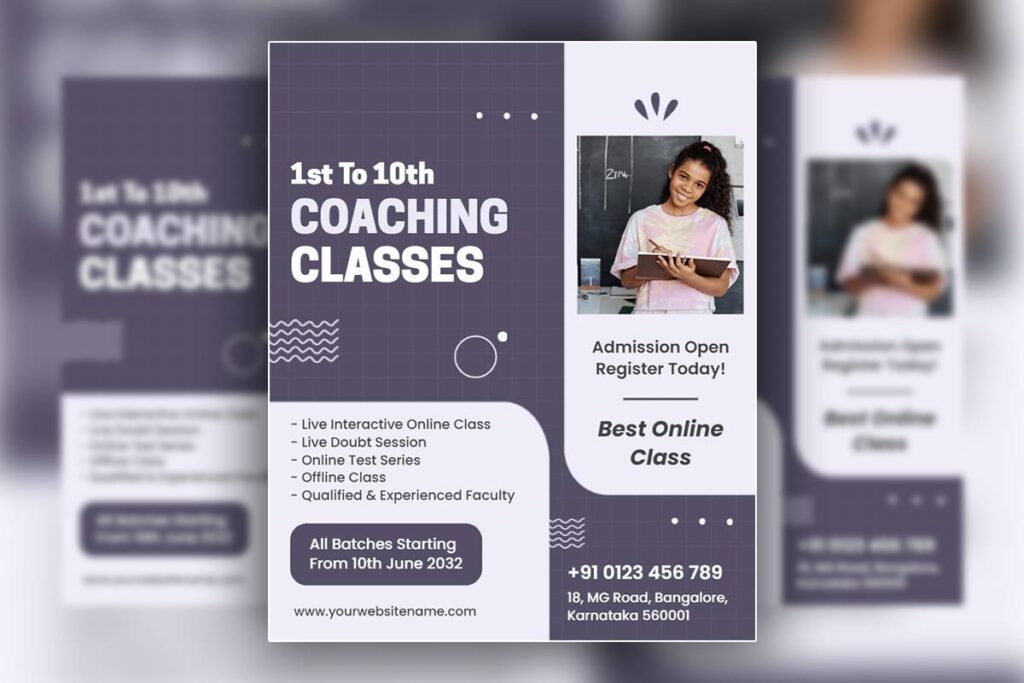
Typography hierarchy uses consistent sizing that guides readers naturally through key messages about continued support and coach availability. Avoid aggressive colors like bright reds or harsh yellows that might trigger stress responses. Instead, incorporate accent colors sparingly through subtle highlights that draw attention to positive messaging about progress continuation and renewed coaching commitment.
Color psychology research demonstrates that blue tones increase trust perception by 35% while green reduces anxiety markers, making these optimal choices for coaching client retention flyers targeting recovery audiences.
Visual Storytelling Through Progress-Oriented Design Metaphors
Effective visual storytelling employs upward-trending graphics, pathway imagery, and growth metaphors that communicate forward momentum rather than regression. Design elements like ascending staircases, blooming flowers, or mountain paths visually reinforce recovery as an ongoing journey with continued progress potential. These life coaching marketing flyers avoid before/after imagery that might trigger shame responses.
Visual hierarchy places success-oriented elements prominently while maintaining balanced layouts that feel supportive rather than pressuring. Icons and graphics should reflect diversity and authenticity, showing real people in recovery contexts rather than stock photography stereotypes. Progress indicators through subtle design elements like completion bars or milestone markers help clients visualize their continued growth potential.
Visual metaphors work best when they’re universally understood yet personally meaningful, allowing clients to project their own recovery experiences onto the design narrative.
Branding Consistency Elements That Reinforce Coach Reliability
Consistent branding elements across coaching retention flyers build trust through recognizable visual patterns that clients associate with stability and professional competence. Logo placement, color schemes, and typography choices should mirror existing coaching materials to create seamless brand recognition that reinforces continuity during disruption periods. Professional photography of the actual coach maintains personal connection while establishing credible expertise. Following established coaching flyer design guide principles ensures that retention materials maintain the same professional standards as initial marketing efforts.
Brand consistency extends beyond visual elements to include tone, messaging style, and value proposition presentation that clients remember from previous coaching interactions. Contact information formatting, testimonial presentation, and service description layouts should follow established patterns that clients find familiar and trustworthy.
Quality indicators like professional certifications, years of experience, and specialized recovery training should appear consistently across all materials using identical formatting and placement. This consistency signals reliability and helps clients feel confident about re-engaging coaching relationships.
Brand elements should balance professionalism with approachability, avoiding overly corporate aesthetics that might feel intimidating to clients navigating recovery challenges. Consistent application of these elements creates visual familiarity that supports client comfort during re-engagement decisions.
How can coaching retention flyers differentiate recovery specialists from crisis management coaches?
Coaching retention flyers can differentiate recovery specialists by emphasizing long-term transformation versus immediate crisis intervention. Recovery specialists should highlight their expertise in sustained behavioral change, relapse prevention strategies, and comprehensive life rebuilding programs. Their coaching service retention materials should showcase success stories spanning months or years, focus on holistic wellness approaches, and feature specialized certifications in addiction recovery or mental health coaching. Unlike crisis management coaches who address urgent situations, business coaching promotional flyers for recovery specialists should emphasize patience, ongoing support systems, and evidence-based recovery methodologies that create lasting positive change.
Showcasing Long-Term Recovery Expertise Through Specialized Credential Messaging
Recovery specialists should prominently display addiction counseling certifications, mental health coaching credentials, and years of experience in sustained recovery work on their coaching retention flyers. Include specific training in evidence-based recovery methods like cognitive behavioral therapy, mindfulness-based relapse prevention, or trauma-informed care approaches. Feature completion rates for long-term recovery programs rather than crisis resolution statistics. Highlight ongoing education in addiction recovery trends, dual diagnosis treatment, or family systems therapy. Life coaching marketing flyers should showcase partnerships with treatment centers, medical professionals, or recovery organizations that demonstrate comprehensive care coordination. Present testimonials from clients who maintained recovery for extended periods, emphasizing sustained transformation rather than immediate problem-solving victories.
Highlighting Holistic Wellness Approaches Versus Emergency Response Tactics
Recovery coaching specialists should emphasize comprehensive life reconstruction through their coaching client retention flyers rather than rapid crisis stabilization. Showcase services addressing multiple life areas: employment support, relationship rebuilding, financial management, housing assistance, and health improvement programs. Feature integration with medical care, therapeutic services, nutritional counseling, and spiritual guidance resources. Present recovery as lifestyle transformation requiring gradual, sustainable changes across all life domains. Contrast this comprehensive approach with crisis management’s narrow focus on immediate symptom relief or emergency intervention. Demonstrate understanding of recovery as ongoing process requiring continuous support rather than problem-solving event with defined endpoints. Include visual elements showing balanced lifestyle components: physical health, emotional stability, social connections, and meaningful activities.
Positioning Sustained Support Systems Over Short-Term Crisis Interventions
Recovery specialist flyers should emphasize availability during vulnerable moments throughout the recovery journey, positioning coaches as consistent allies rather than emergency responders. Highlight 24/7 support availability, regular check-in schedules, and proactive outreach during high-risk periods like anniversaries, holidays, or life transitions. Present recovery coaching as marathon support requiring endurance, patience, and commitment to gradual progress rather than sprint interventions focused on immediate crisis resolution. Feature relapse prevention planning, ongoing accountability structures, and adaptive support that evolves with changing recovery needs over months and years. Showcase understanding that recovery involves setbacks requiring compassionate guidance rather than crisis management’s problem-elimination focus. Include testimonials emphasizing how consistent support prevented crises rather than resolved them. Demonstrate expertise in maintaining hope during difficult periods, celebrating small victories, and adjusting approaches based on individual progress patterns. Position coaches as recovery journey companions providing stability, encouragement, and expertise throughout long-term transformation process rather than temporary crisis intervention specialists.
What timing strategies work best when sending coaching retention flyers to former recovery clients?
Strategic timing for coaching retention flyers centers on predictable vulnerability windows and emotional readiness periods when former recovery clients are most receptive to re-engagement. Successful coaches deploy these materials during recovery anniversary dates, seasonal transitions, and post-completion milestones rather than random outreach attempts. Research shows 30, 60, and 90-day intervals post-completion achieve highest response rates, with seasonal transitions creating natural opportunity windows for renewed coaching relationships.
Leveraging Recovery Anniversary Dates for Maximum Emotional Connection
Recovery anniversaries represent powerful emotional touchpoints when clients naturally reflect on their progress and future goals. Coaching service retention materials sent within two weeks of significant dates – such as sobriety anniversaries, program completion dates, or personal milestone achievements – capitalize on heightened motivation and self-reflection periods. These dates trigger natural evaluation of support systems and growth opportunities.
Business coaching promotional flyers should acknowledge specific achievements without overwhelming clients with detailed program expectations. Simple recognition messages like “Celebrating your 6-month milestone” combined with gentle availability statements create emotional resonance without pressure. Recovery specialists report 35-40% higher response rates when flyers arrive during anniversary weeks compared to random timing. The key involves maintaining detailed client milestone calendars and preparing materials 30 days in advance to ensure consistent delivery during these critical windows when former clients are most open to continued growth partnerships.
Seasonal Transition Periods as Strategic Re-Engagement Windows
Seasonal changes trigger natural life reassessment periods, making them optimal windows for coaching client retention flyers distribution. Spring represents renewal and goal-setting energy, while fall creates reflection and preparation mindsets. Life coaching marketing flyers distributed during these transitions align with clients’ internal readiness for change and growth initiatives.
January, September, and April show consistently higher engagement rates as clients navigate New Year resolutions, back-to-school energy, and spring motivation cycles. Recovery specialists should prepare coaching retention flyers highlighting seasonal themes – renewal, fresh starts, or preparation for upcoming challenges. Avoid holiday periods when clients may be overwhelmed or family-focused.
Successful seasonal campaigns acknowledge natural life rhythms while connecting them to recovery goals. Messages like “Spring into your next chapter” or “Fall preparation for continued growth” resonate because they match clients’ existing mindset shifts. Distribution should occur 2-3 weeks before seasonal peaks to capitalize on building motivation rather than competing with seasonal overwhelm periods.
Post-Completion Milestone Intervals for Sustained Relationship Building
Systematic outreach at 30, 60, and 90-day post-completion intervals creates sustained connection opportunities during critical transition periods when former clients navigate independence challenges. These intervals correspond with natural support-seeking cycles as clients encounter real-world situations without immediate coach guidance.
The 30-day mark represents initial independence testing, when clients are processing their first month without regular coaching support. Coaching retention flyers should focus on celebration and gentle check-in messaging rather than program promotion. Messages emphasizing continued availability and celebrating their independence build confidence while maintaining connection.
Sixty-day intervals often coincide with first significant challenges or setbacks. Life coaching marketing flyers during this window should acknowledge potential difficulties while reinforcing the client’s capability and offering refresher support options. This timing catches clients before they feel completely disconnected from their support system.
The 90-day milestone represents major independence achievement worthy of recognition. Business coaching promotional flyers should celebrate this success while introducing advanced coaching concepts or specialized programs for continued growth. This timing allows coaches to position themselves as long-term growth partners rather than crisis intervention resources, creating opportunities for higher-level coaching relationships that build on established foundations rather than starting from crisis points.
People Also Ask
- What makes coaching retention flyers effective for recovery specialists? |Effective coaching retention flyers combine personal connection with professional reassurance, using compassionate messaging that acknowledges interruptions while focusing on renewed commitment and specialized recovery expertise.
- How to write coaching retention flyers that rebuild trust after business disruption? |
Write honest, brief acknowledgments of absence, emphasize renewed availability, use client-specific references where appropriate, and focus on moving forward together rather than explaining disruptions. - When should recovery coaches send coaching retention flyers to former clients?
Send retention flyers 2-3 weeks after resuming practice to allow operational stability while preventing complete client disengagement from your recovery coaching services. - What response rate do coaching retention flyers achieve for recovery practices?
Recovery coaching specialists typically achieve 15-25% response rates from retention flyers due to the critical nature of recovery support and strong client-coach relationships. - How to design coaching retention flyers that protect client confidentiality?
Use discrete wellness language, avoid specific recovery terminology, ensure private envelope addressing, and focus on general personal growth rather than addiction-specific milestones. - What call-to-action works best in coaching retention flyers for recovery clients?
Use low-pressure options like ‘schedule a brief check-in’ or ‘text to update me’ with multiple contact methods to accommodate different comfort levels.
Frequently Asked Questions
- How quickly should recovery coaches send retention flyers after a business interruption?
Send flyers within 2–3 weeks of resuming practice to maintain continuity and prevent disengagement. - What tone should coaching retention flyers use for clients who’ve experienced setbacks?
Use compassionate, non-judgmental language that emphasizes “continuing your journey” rather than starting over. - Should coaching retention flyers offer discounts to win back recovery clients?
Avoid heavy discounts. Instead, provide added value like longer sessions, extra check-ins, or relapse prevention tools. - How do coaching retention flyers address confidentiality concerns in recovery work?
Use discreet wellness language, avoid explicit addiction terms, and ensure privacy in addressing and messaging. - What response rate can recovery coaches expect from retention flyers?
Typically 15–25%, higher than general coaching. Personalized follow-ups may add another 10–15%. - How should coaching retention flyers handle clients who may have relapsed during interruptions?
Use inclusive phrases like “wherever you are in your journey” to offer support without assumptions. - What call-to-action works best in coaching retention flyers for recovery specialists?
Low-pressure options such as “Schedule a check-in call” or “Text to reconnect” with flexible contact methods. - Should coaching retention flyers mention the reason for the business interruption?
Offer brief, honest acknowledgment without details. Focus on renewed availability and client success.
- How do coaching retention flyers compete with crisis management coaches clients may have found?
Stress continuity, existing rapport, and deep knowledge of client history as key advantages. - What visual elements work best in coaching retention flyers for recovery clients?
Use calming colors, simple layouts, white space, and professional photos. Subtle symbols like bridges suggest progress.
Conclusion
Successful flyer-based retention turns business interruptions into opportunities for re-engagement, strengthening client trust and restoring visibility. Recovery coaching flyers must use rebuilding imagery and recovery themes that emphasize continuity rather than starting over. Specialists can explore comprehensive strategies to promote life coaching services with flyers that address both retention and new client acquisition simultaneously. Compassionate, non-judgmental messaging, calming visuals, and authentic representation reassure clients while reinforcing the coach’s renewed commitment.
Specialists differentiate through long-term transformation expertise and holistic wellness approaches instead of crisis-only tactics. Retention flyers should highlight sustained client journeys, evidence-based methods, and consistent support systems that demonstrate deep understanding of life rebuilding processes. Competitive positioning comes from patience-driven coaching relationships rather than quick fixes.
Strategic re-engagement uses milestones, seasonal transitions, and referral networks to maximize emotional connection and visibility. Flyers must preserve progress by valuing prior achievements while offering clear recovery pathways. Success depends on transparency, supportive communication, and high-quality content that rebuilds trust, reduces barriers, and reinforces professional credibility.
Reference
- Psychotherapy and Therapeutic Relationship – NCBI.
- Addiction Treatment Retention Guidelines – University of Washington.
- Client Retention Strategies for New Counselors – Grand Canyon University.
- Piloting of motivation and engagement as a stand-alone intervention – UK Government.
